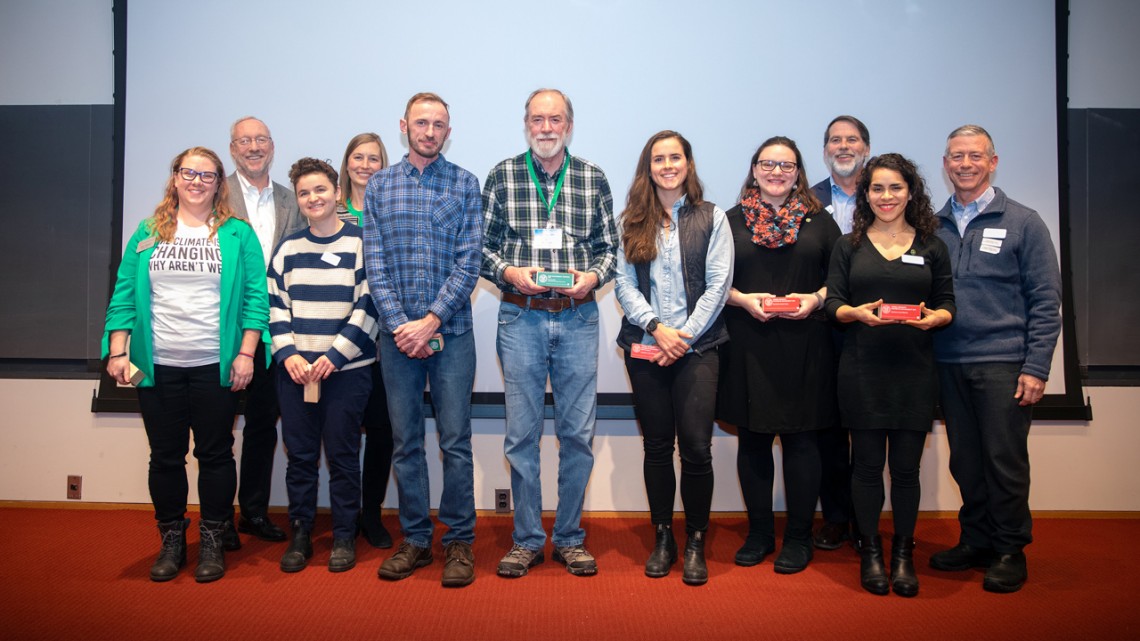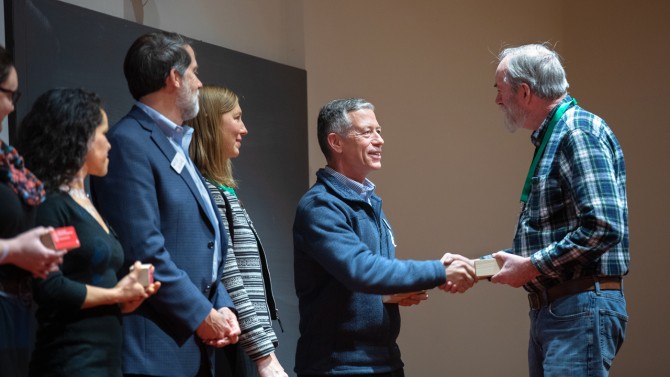
Provost Michael I. Kotlikoff, back row, far left, joins staff and winners of the 2019 Cornell University Partners in Sustainability Awards at the Sustainability Leadership Summit on Dec. 17.
Sustainability summit radiates campus climate progress
By Blaine Friedlander
More than 200 attendees at Cornell’s 2019 Sustainability Leadership Summit Dec. 17 heard how New York state could be a U.S. leader in creating more renewable wind and solar energy, listened about progress on the university’s own sustainability goals and its Earth Source Heat project, and learned how individual Cornellians each made an environmental impact.
Provost Michael I. Kotlikoff complimented the efforts of the Sustainable Cornell Council.
“We have identified priorities for the coming months that will help us focus, but not limit, our vision for campus sustainability,” he said. “I not only support these priorities; I am excited by them. With a council working to mobilize broad participation, we have the expertise, the determination and the collaborative culture to make real progress. For me personally, sustainability is a profoundly important goal for my own vision of what Cornell can and should be.”
The Sustainable Cornell Council announced priorities and working groups for its three steering committees:
- The Carbon Neutral Campus steering committee will examine air travel carbon offsets for faculty trips; analyze the carbon consequences of making versus purchasing electricity over the summer months; and establish a protocol by which to account for upstream methane leakage as a result of natural gas usage on campus.
- The Education and Engagement steering committee will establish working groups to address: an incoming student climate literacy program; ways to accelerate behavioral changes to achieve sustainability goals; and how to define living laboratory research projects.
- And the Campus Operations steering committee has created working groups for transportation, dining operations food-waste reduction and purchasing optimization.
Lance Collins, the Joseph Silbert Dean of Engineering, offered a comprehensive update on Cornell’s Earth Source Heat project, the proposed enhanced geothermal system to heat the Ithaca campus. Background studies have been completed, and Cornell administrators are planning a town hall meeting with members of the Ithaca community in late spring 2020.
In the summit’s keynote address, Joe Martens, director of the New York Offshore Wind Alliance, explained how New York is leading the way in sustainable energy. The state is legally mandated to reach 70% renewable electricity by 2030.
“Climate change is here, and it is happening much faster than anyone anticipated,” Martens said. New York has adopted one of the most ambitious climate laws in the country, he explained.
Martens noted that 31 major wind projects (4,468 megawatts of electricity) are in the queue for the state, but only three – so far – have received permits. To meet the New York climate standards, the state must get grid-scale wind and solar projects under construction, he said.
Sarah Zemanick, director of the Campus Sustainability Office, announced that Cornell is a founding member of the New York Higher Education Large-Scale Renewable Energy Consortium, a group of State University of New York schools and private institutions, to purchase renewable energy. She said the agreement could substantially reduce Cornell’s carbon footprint for the Ithaca campus and help the university reach its 2035 carbon neutrality goal.
Zemanick also told the summit that the university has finalized a 1-megawatt power-purchase agreement with GreenSpark Solar to add rooftop solar energy for the North Campus Residential Expansion project.
In addition to campus reports and updates, the Cornell University Partners in Sustainability Awards recognized groups and individuals who exemplify the university’s sustainability values.
The winners:
- Group Award: Laura Figueroa, doctoral student in entomology, and Jennifer Forbes, director of the Big Red Barn, for creatively applying sustainable solutions to waste at the Big Red Barn;
- Group Award: Ecology House residents and staff, for preserving the ongoing culture of sustainability;
- Individual Award: Taylor Thompson, project coordinator in Facilities and Campus Services, for creating a Green Team and finding sustainable solutions when she worked at the College of Veterinary Medicine;
- Sustainability Champions: Nick Van Eck, research support specialist, and equipment technicians Marc Daly and Bob Wilson of the Cornell University Agricultural Experiment Station, for developing a prototype growth chamber that uses 85% less energy than standard models; and
- Sustainability Champion: Sue Brightly, communications marketing specialist in Human Resources, for personal sustainability endeavors.
Media Contact
Get Cornell news delivered right to your inbox.
Subscribe

